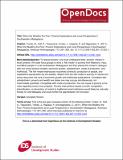| dc.contributor.author | Tucker, B. | |
| dc.contributor.author | Huff, Amber | |
| dc.contributor.author | Tsiazonera | |
| dc.contributor.author | Tombo, J. | |
| dc.contributor.author | Hajasoa, P. | |
| dc.contributor.author | Nagnisaha, C. | |
| dc.coverage.spatial | Madagascar | en_GB |
| dc.date.accessioned | 2014-09-19T15:07:15Z | |
| dc.date.available | 2014-09-19T15:07:15Z | |
| dc.date.issued | 2011-06 | |
| dc.identifier.citation | Tucker, B., Huff, A., Tsiazonera, ., Tombo, J., Hajasoa, P. and Nagnisaha, C. (2011), When the Wealthy Are Poor: Poverty Explanations and Local Perspectives in Southwestern Madagascar. American Anthropologist, 113: 291–305. doi: 10.1111/j.1548-1433.2011.01331.x | en_GB |
| dc.identifier.uri | https://opendocs.ids.ac.uk/opendocs/handle/20.500.12413/4461 | |
| dc.description.abstract | To reduce poverty, one must understand what poverty means in local contexts. We used focus groups to elicit a “folk model” of poverty from Masikoro, Vezo, and Mikea people in rural southwestern Madagascar and then placed this model in dialogue with four social science models: economic growth, substantivism, mode of production, and livelihoods. The folk model emphasizes household continuity, production of people, and exploitative expropriation by the wealthy. Absent from the folk model is scarcity of natural and social resources, the core of economic growth and livelihoods explanations. Consistent with substantivism, poverty and wealth are states one may occupy simultaneously, not maximizable quantities. Compatible with mode of production, the root cause of poverty is the rules regarding control over property. Poverty interventions based on profit, competition, intensification, or devolution of control to traditional social institutions would likely be culturally foreign to rural Malagasy and could further the gap between rich and poor. | en_GB |
| dc.language.iso | en_US | en_GB |
| dc.publisher | American Anthropologist, Wiley | en_GB |
| dc.relation.ispartofseries | 113;2 | |
| dc.rights | This is the pre-peer-reviewed version of the following article: Tucker, B., Huff, A., Tsiazonera, Tombo, J., Hajasoa, P. and Nagnisaha, C. (2011), When the Wealthy Are Poor: Poverty Explanations and Local Perspectives in Southwestern Madagascar. American Anthropologist, 113: 291–305, which has been published in final form at http://onlinelibrary.wiley.com/doi/10.1111/j.1548-1433.2011.01331.x/full | en_GB |
| dc.rights.uri | http://www.ids.ac.uk/files/dmfile/IDSOpenDocsStandardTermsOfUse.pdf | en_GB |
| dc.subject | Development Policy | en_GB |
| dc.subject | Economic Development | en_GB |
| dc.subject | Environment | en_GB |
| dc.subject | Politics and Power | en_GB |
| dc.subject | Poverty | en_GB |
| dc.title | When the Wealthy Are Poor: Poverty Explanations and Local Perspectives in Southwestern Madagascar | en_GB |
| dc.type | Article | en_GB |
| dc.rights.holder | Wiley | en_GB |
| dc.identifier.externaluri | http://onlinelibrary.wiley.com/doi/10.1111/j.1548-1433.2011.01331.x/full | en_GB |
| dc.identifier.team | Knowledge Technology and Society | en_GB |

